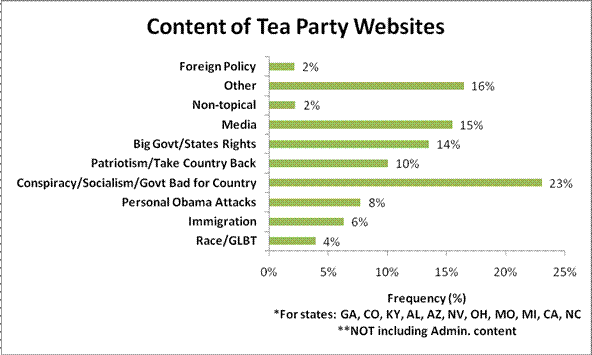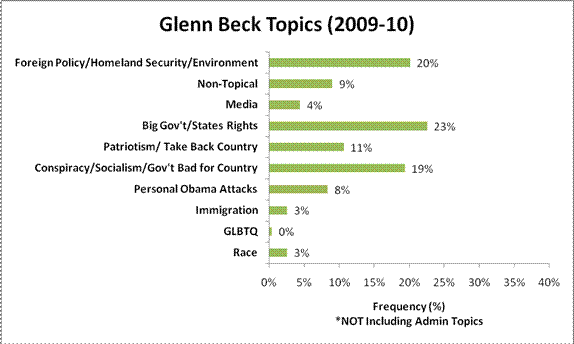|
|
Tea Party Preliminary Content Analysis
2010 Multi-state Survey on Race
& Politics Content Analysis
Prof. Christopher Parker, Principal
Investigator
Christopher C. Towler, Co-principal
Investigator
Supporters
of the tea party have continuously claimed that
their views and opinions reflect those of mainstream America. New results examining the content from over
thirty official tea party websites from close to a dozen different
states
suggests otherwise. Differences in
content emerge when comparing the content from official tea party
websites to
the content from the National Review online, a mainstream conservative
commentary. Only 14 percent of the
content from tea party websites focuses on big government or states
rights,
issues that are supposedly the ultimate concern of the tea party. This is compared to 39 percent of the content
examined from the National Review online.
19 percent of the content from tea party websites
focuses on
immigration, the gay community, race and personal attacks on Obama,
compared to
only 10 percent of the National Review’s online content.
10 percent of posts and articles on tea party
websites focus on patriotism and taking back the country while less
than 1
percent of the content from the National Review online have this focus.
Similarly, 36 percent of the
content from the
National Review online examines national security or foreign policy
compared to
only 2 percent of the content from tea party websites.
Content focusing on socialism, communism, and
the current government ruining the country make up 24 percent of the
content on
tea party websites. Again, this is in
contrast to the National Review online where only 5 percent of the
content is
of this nature. These findings suggest
that the opinions and concerns of the tea party not only differ from
mainstream
America, but also from the conservative mainstream as well.


In addition, content from the Glenn Beck show on Fox
News was examined. The majority of the content on the Glenn Beck show
addressed the size of government and states rights. These topics were
the most popular through both 2009 and 2010, but this content was more
of a focus in 2010. Content on conspiracy, communism, or socialism made
up 16 percent of the content from the show in 2010 and 19 percent of
the content going back to 2009, but unlike the tea party websites, this
content is never the predominant focus of the show. Content on race,
gays and lesbians and immigration do not make up much of the content
from the Glenn Beck show; yet, this content makes up 19 percent of tea
party websites. If anything, these findings again show that the tea
party views and opinions are out of step with both mainstream and
conservative thought.


When examining the content from the tea party websites a
few things stand out. Content based upon conspiracies of socialism, or
simply that an Obama-led government is bad for the country, made up
close to one quarter of the content from the tea party websites (24
percent); this is compared to 16 percent of the content from the
National Review online and 19 percent from the Glenn Beck show.
Additionally, content on the danger of big government or importance of
states rights made up 39 percent of the National Review online content
and 23 percent of the Glenn Beck show content, compared to only 14 of
the tea party website content. We also find that personal attacks on
President Obama and content on race, immigration and gays and lesbians
were 19 percent of the tea party website content. Yet, only 10 percent
of the National Review online content and 6 percent of the content from
the Glenn Back show was of this nature. Finally, less than 1 percent of
the content from the National Review online focused on taking back the
country and patriotism, compared to 10 percent of the content from tea
party websites and 11 percent of the content from the Glenn Beck show.
The data for the analysis on tea party websites was
collected from 5 states identified as top tea party venues by a Rasmussen
report conducted in June as well as from 6 more battle ground
states. 1,079 articles and posting from 31 official tea party websites
(websites that represent the state in its entirety such as the Colorado
Tea Party, or websites from a major city or region of the state) were
examined dating back no further than 2009. The content from these
websites, if not analyzed in its entirety, was randomly sampled in
order to accurately represent all of the content within the website
over time. Websites and blogs that did not represent the state, major
city or region within the state, blogs that did not have official
domain names as well as the comments on blog posts and articles were
not part of the analysis. By limiting our examination to these websites
we are focusing on a section of the elite dialogue taking place online
by the communication leaders within the tea party. If anything, our
results present a conservative estimate of the online content
circulated and discussed by tea party supporters.
The content for the National Review online consisted of 754 articles
from the online website that were sampled by examining every Tuesday,
Thursday and Saturday throughout 2009 to achieve a representative
sample of the entire year. The Glenn Beck show content was examined by
analyzing transcripts from 844 segments on 170 different shows. The
past five quarters of the show in 2009 and 2010 were examined such that
every Monday, Wednesday and Friday show was analyzed in the first,
third and fifth quarter and every Tuesday and Thursday show was
analyzed in the second and fourth quarter. Content was coded by
identifying the topic of a segment within each show, so segment changes
in the transcripts dictated when new content appeared on each show.
This again creates a representative sample of the content on the Glenn
Beck show in 2009 and 2010 as the shows examined were randomly selected
throughout each quarter. The content analysis had a final inter-coder
reliability of .84.
Note: The final Tea Party Content Analysis appears in the new book, Change They Can't Believe In: The Tea Party and Reactionary Politics in America.
Results for racial
resentment, immigration policy, and gay rights- click here
Attitudes
towards
equality and liberty - click here
Racial Stereotypes: Blacks
and
Latinos
Racial Stereotypes: Asians
and
Whites
Survey Press Release, posted at
UWNews.org
Tea Party Content
Analysis
Contact Prof. Parker via email at: csparker@uw.edu, or
visit his web
page
Media Featuring MSSRP Data:
Professor
Parker's
Comments
on Salon.com
Joan
Walsh's
Comments
on Salon.com
Leonard
Pitts's
Column
in the Miami Herald
Arian
Campos-Flores in Newsweek
Tom
Schaller
on
538.com
|

